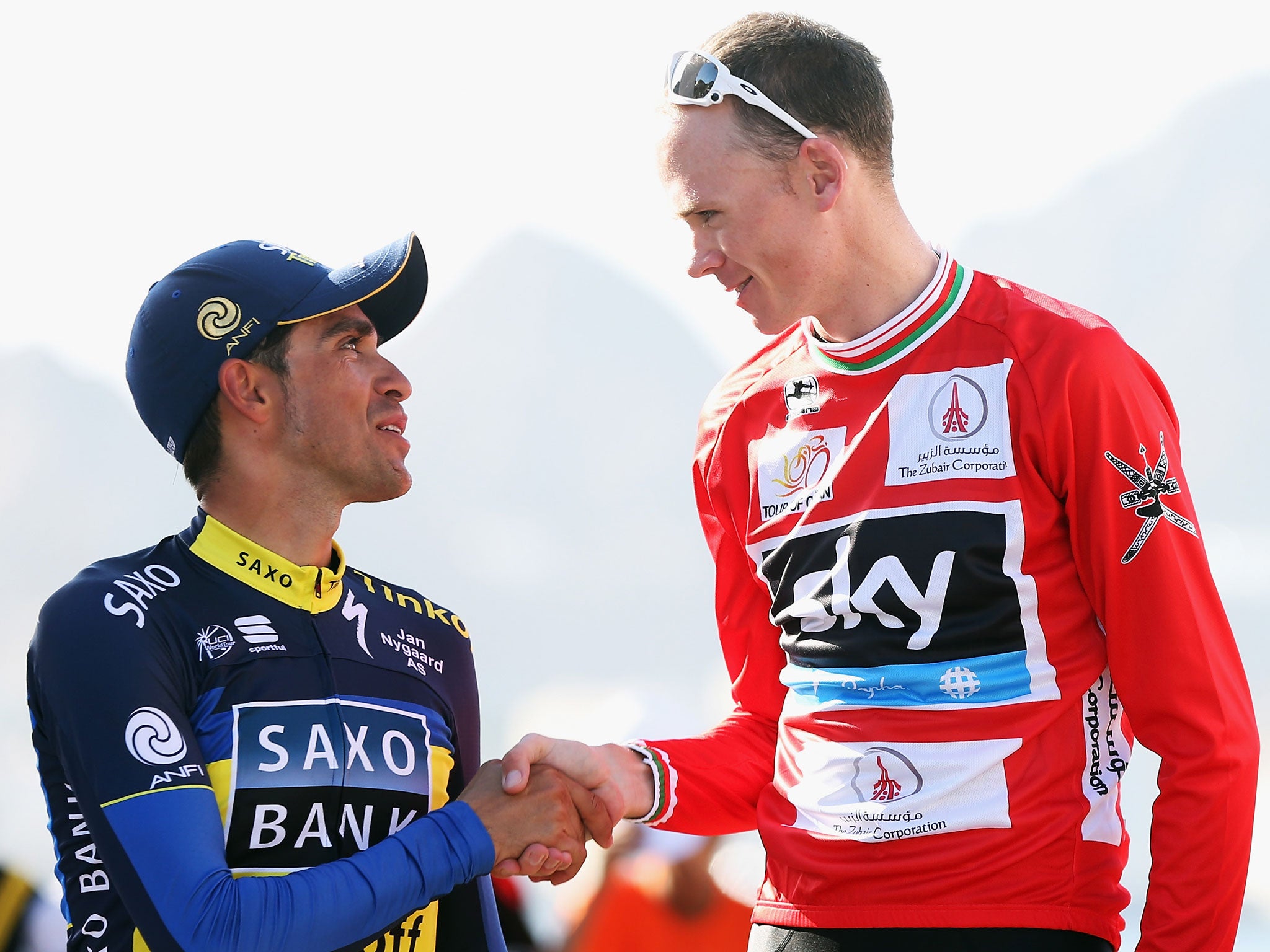Cycling: Chris Froome ready for Tour de France rehearsal
In Bradley Wiggins' absence, Dauphiné gives his Sky team-mate a chance to set the stage for July's big race

Your support helps us to tell the story
From reproductive rights to climate change to Big Tech, The Independent is on the ground when the story is developing. Whether it's investigating the financials of Elon Musk's pro-Trump PAC or producing our latest documentary, 'The A Word', which shines a light on the American women fighting for reproductive rights, we know how important it is to parse out the facts from the messaging.
At such a critical moment in US history, we need reporters on the ground. Your donation allows us to keep sending journalists to speak to both sides of the story.
The Independent is trusted by Americans across the entire political spectrum. And unlike many other quality news outlets, we choose not to lock Americans out of our reporting and analysis with paywalls. We believe quality journalism should be available to everyone, paid for by those who can afford it.
Your support makes all the difference.It is four weeks before the Tour gets underway at Porto Vecchio, but the curtain on cycling's blue riband event effectively goes up today at Critérium du Dauphiné.
The eight-day long Dauphiné has long been considered the best form guide for cycling's main event, and is nicknamed "le mini-Tour de France". Hence the presence of the top Tour contenders, Chris Froome and Alberto Contador. With Sir Bradley Wiggins no longer defending his Tour title in July, there is great interest in how Britain's 2012 Tour runner-up and the winner in 2007 and 2009 perform this week.
That the Dauphiné does not – unusually – start in France this year, but with a 121-km grind round the Alpine foothills in western Switzerland before heading west into home territory tomorrow barely matters. Three things explain why the Dauphiné is considered so important for the Tour: participation, terrain, which deliberately mimics important elements of the bigger race, and timing.
The Critérium du Dauphiné is a tempting prize. Unofficially ranked immediately below the three Grand Tours – Giro, Vuelta and Tour de France – its past winners comprise such prestigious figures as five-times Tour winners Miguel Indurain, Eddy Merckx and Bernard Hinault, plus Wiggins in 2011 and 2012.
With Wiggins absent from the Dauphiné, Froome will be hoping to continue his runaway success of the early season. Victorious in the Tour of Oman in February, then the Critérium International in March and the Tour of Romandie in April, a victory or podium place this week will show he is ready to follow in Wiggins' wheeltracks in July.
However, the Dauphiné opposition is arguably far stronger than in 2012: Contador, the five-times Grand Tour winner and widely tipped as Froome's biggest rival in July, has yet to make any impact in racing this year. Contador needs no reminding that a victory in the Dauphiné, or finishing ahead of the Briton, would give him the psychological upper hand going into the Tour de France. A defeat would keep the Spaniard on the back foot, just as he has been since losing to Froome in Oman in February.
This year's Dauphiné also acts as a timely reminder that the Tour's general classification is far from being just about the Briton and Spaniard. Joaquim Rodriguez, twice ranked No 1 in the world in cycling's season-long classification, is taking part, as is Jurgen Van Den Broeck, fourth in last year's Tour de France. Then there is Pierre Rolland, France's outsider for the Tour classification, and Alejandro Valverde, a double winner of the Dauphiné. All of them see the Dauphiné as the best reference point for a strong Tour performance.
For the first time since 1967, the Tour is starting without a short prologue – a time-trial – and so, too, is the Dauphiné, opting, like the Tour, for a short, punchy mass-start stage. Echoing the decision of this year's Tour to reduce the importance of time trialling, the Dauphiné has cut back on the length of its midweek race against the clock from 53.5km to 32.5.
Most important of all, though, is the Dauphiné's inclusion of the Alpe d'Huez, France's most legendary climb – of which there is a double ascent in this year's Tour – on stage seven next Saturday. Like the Tour, the Dauphiné will tackle the Alpe d'Huez's 21 hairpin bends and follow that up with an unprecedented breakneck descent back into the Oisans valley. For riders, this will be invaluable practice for the Tour.
Like any dress-rehearsal, the position of the Dauphiné in the calendar does gives room for rectification prior to the Tour, should riders show poor form or be overly ahead of their game. There is also time for last-minute changes of the Tour cast, with 2011 winner, Cadel Evans, and Colombian Nairo Quintana, the man who beat Wiggins and Froome in the toughest stage of the Dauphiné last year, skipping this Dauphiné and training at home for July. But even those missing the Dauphiné will be keeping the closest of eyes on how the race goes.
Join our commenting forum
Join thought-provoking conversations, follow other Independent readers and see their replies
Comments